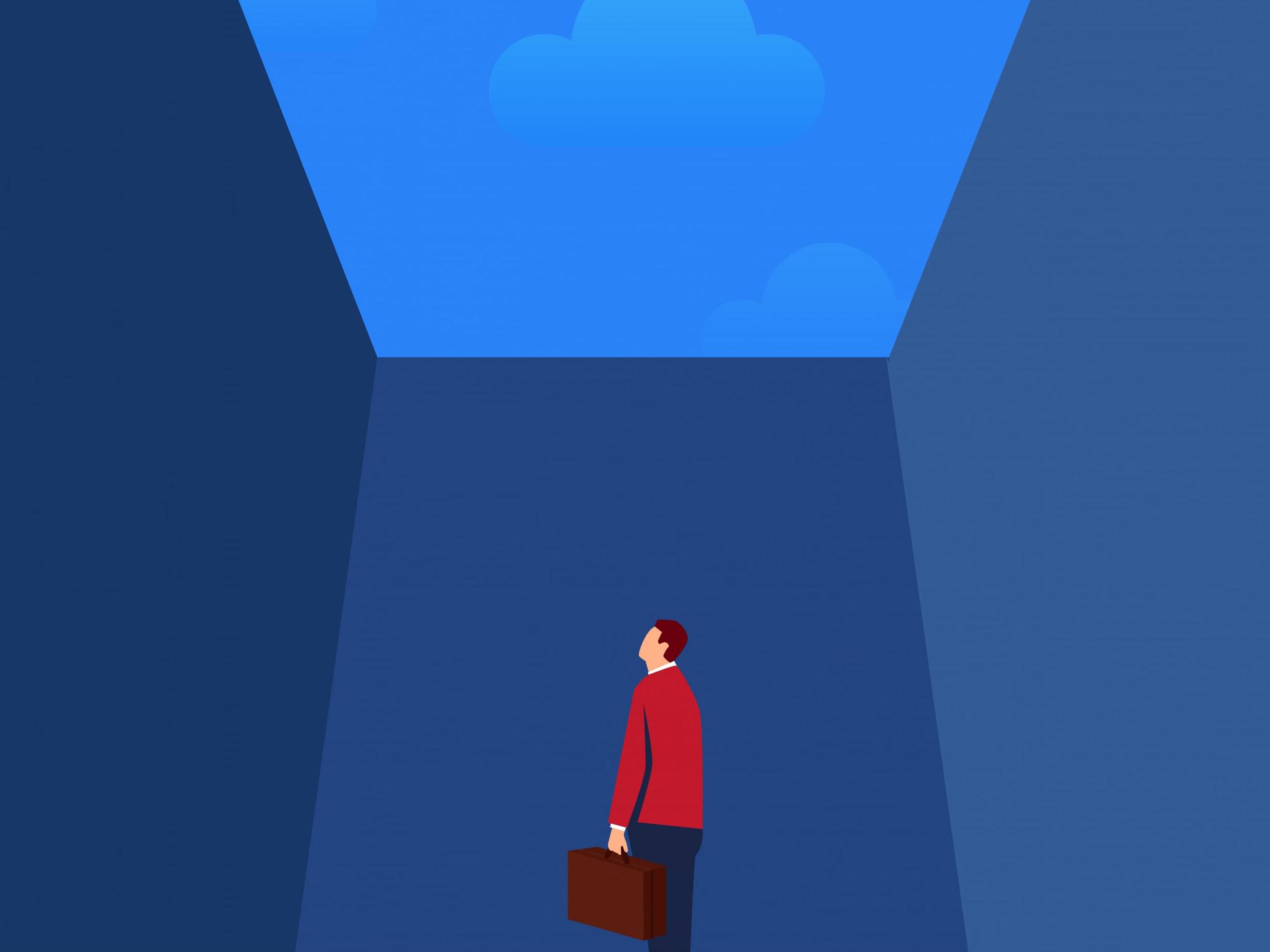World Mental Health Day: The recession is here. Get ready for the mental health pandemic
As the UK officially enters a recession, Natasha Preskey examines how the difficulties of the Covid-19 pandemic are about to become a mental health crisis, as well as a physical one


Your support helps us to tell the story
From reproductive rights to climate change to Big Tech, The Independent is on the ground when the story is developing. Whether it's investigating the financials of Elon Musk's pro-Trump PAC or producing our latest documentary, 'The A Word', which shines a light on the American women fighting for reproductive rights, we know how important it is to parse out the facts from the messaging.
At such a critical moment in US history, we need reporters on the ground. Your donation allows us to keep sending journalists to speak to both sides of the story.
The Independent is trusted by Americans across the entire political spectrum. And unlike many other quality news outlets, we choose not to lock Americans out of our reporting and analysis with paywalls. We believe quality journalism should be available to everyone, paid for by those who can afford it.
Your support makes all the difference.Consultant psychiatrist Dr Natasha Bijlani, who works at the Priory hospital in Roehampton, London, has never been busier at work than in the last few weeks of lockdown. “I’m not saying that in a happy way at all,” she is keen to stress. “It’s really sad to see how many people who wouldn’t otherwise be coming to someone like me are [now] feeling the need to seek support.”
According to figures released by the Office for National Statistics in July, the number of people in the UK affected by depression has risen from one in ten to one in five since the same time last year. Similarly, a global survey of almost 300,000 people by Kantar Health found that the proportion of people who are experiencing depression symptoms had risen from 7 per cent to 11 per cent since the start of the pandemic.
It is perhaps not surprising that people have been experiencing poor mental health in 2020; dealing with the physical threat of Covid-19, feelings of isolation brought on by lockdown, distance from support networks of family and friends, and the uncertainty of future restrictions has taken its toll. “To feel comfortable and be in a state of mental and emotional equilibrium, you need to have stability in your life,” says Dr Bijlani.
But as lockdown slowly lifts and the daily virus death toll reduces (although cases in England have grown in the last week), the early concerns of immediate threat to life and separation from loved ones have morphed into longer-term worries about redundancies, job prospects and the economy. The ONS has reported the largest rise in unemployment in the UK since the 2008 financial crash, and the UK is officially back in a recession.
And there are more financial obstacles on the horizon: a report by the Institute for Public Policy Research warned that the end of Rishi Sunak’s furlough scheme in October, which saw employees paid 80 per cent of their salary by the government, will lead to unemployment at rates “not seen since the Great Depression”. The UK will also have to deal with the economic consequences of Brexit when the transition period with the EU ends on 31 December. Now we are not only dealing with a health crisis, but an economic one too.
Economic recessions lead to increased levels of mental illness, suicide and suicidal behaviour
The last comparable economic downturn in the UK was the 2008 financial crash. The US’s largest investment bank, Lehman Brothers, had collapsed, sparking an unprecedented crisis in the global financial system. Stock markets tumbled, and in the UK, RBS and Lloyds had to be bailed out by the government. In the years that followed it wasn’t the banks who suffered.
David Taylor-Robinson, professor of public health and policy at the University of Liverpool, tells The Independent that research by his team found there had been 1,000 excess deaths by suicide from 2008-2010. A separate study from the University of Bristol concluded unequivocally: “Economic recessions lead to increased levels of mental illness, suicide and suicidal behaviour.
“Unemployment, financial difficulties, debt and loss of a home increase an individual’s risk of depression, suicide attempt and suicide. Rises in unemployment appear to account for less than half of the increase in suicide deaths during recessions; debt and the impact of austerity measures are likely to be other important contributors to the rises,” the report continues.
Contemporary reports after the 2008 crash also found people with existing mental illness were hit harder by the recession than their peers. The researchers found a consistent pattern – people with mental health problems were more likely to be unemployed following a recession.
Prof Taylor-Robinson tells The Independent that a deterioration in mental health resulted from factors that “determine mental health at a population level”, like people not having enough money and feeling insecure in their place of work. But a recession not only causes lost jobs, or lost income, meaning you are unable to pay bills, but a change in terms of self-perception.
“The shock of losing your source of income is going to affect people in a huge way,” says Dr Bijlani. “And work isn’t just about the money, it’s about having a sense of purpose, identity and structure.” Dr Bijlani says the mental health consequences of the recession won’t just be limited to those who are actually made redundant and points out that the looming possibility of losing a job will have its own psychological impacts.
The coronavirus pandemic is as much a mental health emergency as it is a physical one
Mental health charity Mind has already started calling for the government to “urgently” plan for recovery from the coronavirus “mental health crisis”, saying: “The easing of lockdown won’t address many of the underlying issues and the worst is yet to come; the impact on mental health of unemployment, financial difficulties and housing issues will grow as government-led emergency support measures come to an end and recession bites.”
Paul Farmer, chief executive of Mind, said: “The coronavirus pandemic is as much a mental health emergency as it is a physical one. The devastating loss of life, the impact of lockdown, and the inevitable recession that lies ahead will leave a deep and lasting scar on our nation’s mental health.”
According to Dr Rachel Chin, consultant clinical psychologist at the Pennine Care NHS Foundation Trust, the mental health impact of job losses tends to amount to a “domino effect”. This can contribute to a drop in energy and drive, making it harder to employ coping strategies.
The start of a recession might also be the final straw in a long line of difficulties this year has thrown up for individuals. “We’re going through really tough challenges – and compounded challenges as well. That’s the key at the moment. It’s not just one thing for a lot of people, it’s a snowball effect,” says Dr Chin.
Dr Chin says we can already see the impact of this in figures around poor coping methods, like excessive drinking. A series of surveys analysed by the Institute for Alcohol Studies reported that between a fifth and a third of people had been drinking more in lockdown. The British Liver Trust, a charity supporting those living with the medical consequences of alcohol use, has also seen a five-fold increase in calls to its helpline since the end of March.
“We’ll see more people coming in with significant needs, and more people accessing mental health services for the first time,” Dr Chin says of the probable impacts, adding that there will likely be an increase in symptoms of depression, anxiety and self harming behaviours.
The Covid-recession will have an added psychological element, says Dr Chin – the guilt experienced by those who are struggling but feel that, compared to others who’ve had worse experiences, for example, losing family members to the virus, they have no right to be unhappy.
One outcome of what Dr Chin calls the “heroic narrative” surrounding frontline workers is that some people feel hesitant to seek professional help, as they fear putting extra pressure on the NHS. “I think people try to withhold and cope,” she says. “And I guess that’s why you might see more unhelpful but more accessible ways of coping, such as increase in drugs and alcohol use.”

This recession will also be building upon the foundations laid by the previous downturn and a decade of austerity measures implemented by the government – even though prime minister Boris Johnson has promised there will be no return to the austerity of ten years ago this time around – the aftershocks are still being felt now. Prof Taylor-Robinson says: “Stressful events like recessions can have long-lasting generational effects. The shock of those events, and then policies that throw families and children into poverty, can subsequently amplify those effects.”
One of the biggest concerns about getting people to access help is that many people are now working remotely and having less face-to-face contact with the outside world, as well as with colleagues, friends and family. Not only will this mean that people are less likely to reach out for help, but are also more likely to suffer in silence, compounding their poor mental state.
“I think a lot of people working from home, because they’re worried about losing their job, must be going out of their way to please their employer and responding to emails at all hours,” says Dr Bijlani. “I’m worried that there are going to be a lot more people experiencing burnout and excessive anxiety – and it’s going to affect their sleep.”
Professor Taylor Robinson believes much of the impact can, and should, be mitigated at a society-wide level with economic and social policy. The furlough scheme was one such example, but he says more can be done. “The furlough scheme showed that you can implement social protection for people who lose their jobs on a massive scale, and they’re the type of measures that will protect people’s mental health,” he says.
“There’s evidence to suggest that in Scandinavian countries and other places where they have good labour market protection and welfare support, it’s not inevitable that a shock like this leads to deterioration in mental health,” he adds.
Dr Chin also says, while anxieties around employment may be unavoidable for many people, there are daily coping strategies individuals can employ to try and mitigate the worst risks. The psychologist recommends using a mental wellbeing app which is led by “qualified and trained professionals or clinicians” like Calm or Headspace.
She also suggests allotting a period of time each day for focusing on worries and reflecting on what is and isn’t within our control. “It’s not about trying to block our worry, it’s about recognising the significance and importance of it,” she says. “It might be half an hour a day where people write down some of these worries or thoughts or fears and just acknowledge it.”
After an initial drop in the numbers of people accessing mental health services during lockdown, Dr Chin says more of us are now starting to seek help. “As we move more into a recovery phase, rather than an active acute phase, we’re starting to see that some of those levels of referrals are what they were prior to Covid-19, if not higher already, and I would predict a much higher increase in future as well,” she says.
You can contact the Samaritans helpline by calling 116 123. The helpline is free and open 24 hours a day every day of the year.
You can also contact Samaritans by emailing jo@samaritans.org. The average response time is 24 hours.
For mental health info and support, visit mind.org.uk, call 0300 123 3393, text 86463 or email info@mind.org.uk.
Join our commenting forum
Join thought-provoking conversations, follow other Independent readers and see their replies
Comments